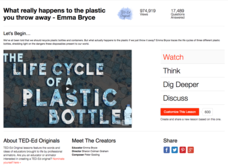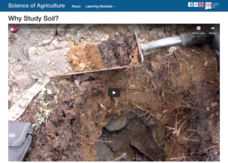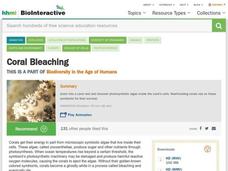TED-Ed
What Is the Tragedy of the Commons?
What's good for all of us is good for each of us. The Tragedy of the Commons refers to a situation in which one person's decision to act in his or her own best interest negatively affects the rest of the population—and ultimately, him or...
Fuse School
What Is The Natural Greenhouse Effect?
The Greenhouse Effect is a big part of why Earth is able to sustain life. But, how much is too much? In part two of an eight-part series about the carbon cycle, environmental scholars learn how the natural Greenhouse Effect keeps us warm...
California Academy of Science
What is the Environmental Impact of Feeding the World?
One in every seven people suffer from a lack of basic food. Our Hungry Planet introduces this complex issue in the second lesson of an interesting 13-part unit. It discusses the space needed to grow and raise food, the transportation of...
Curated OER
Crude Oil
Watch the distillation process as a female narrator explains what is happening. Ideally you would demonstrate this process or have advanced classes work in lab groups to perform it themselves. If time is short or materials not available,...
Curated OER
The Solid Earth - Environmental Science
What is the solid part of the earth and how does it effect our environment? Professor Paul Tackley explains how the active, solid part of the earth is responsible for volcanoes, earthquakes, and plate tectonics. He uses solid examples...
TED-Ed
What Really Happens to the Plastic You Throw Away
Inspire environmentally conscious young minds with an exceptional video, which traces the life cycles of three different plastic bottles after they are thrown away and move through the earth with different journeys through a...
TED-Ed
What is Epigenetics?
Epigenetics has more to do with external influences than with our genetic code. Environmental factors can cause different genes to become more or less active in individuals. Watch an informative video to discover how...
TED-Ed
Why the Arctic Is Climate Change's Canary in the Coal Mine
What happens in the Arctic doesn't always stay in the Arctic. Follow along with this short video as it investigates how small changes in the temperature of Arctic regions can have dramatic effects on the global climate through a series...
Learning Games Lab
Choosing A Career
Careers in science aren't limited to labs. Pupils learn about different aspects of careers in agriculture through the lens of several scientists. The scientists talk about how the field of soil science is a growing in this important...
Crash Course
Controlling the Environment: Crash Course History of Science #39
What would the world look like if we could control the weather? Historically, countries have attempted to do just that, but their intentions were not always good! The 39th lesson in a History of Science series describes science projects...
Learning Games Lab
Why Study Soil?
Some scientists spend their entire careers analyzing and learning about soils. An interesting video lesson provides an overview of what soil scientists do and why. Pupils learn how soil analysis connects to other branches of science...
Curated OER
Cameron Diaz Talks Trees
What is so wonderful about trees? Professor Grover and Cameron Diaz explain all of the amazing things trees can do. Viewers will learn that trees clean the air, give us shade, provide us with food, and are home to many animals.
Howard Hughes Medical Institute
Coral Bleaching
What is coral bleaching? Tackle a trendy topic with a narrated animation. Through a combination of video and illustration, the narrator introduces viewers to a coral reef, then goes inside a coral polyp to show its symbiotic relationship...
Be Smart
97% of Climate Scientists Really Do Agree
Why do some people still question climate change? Discover the components of consensus with a video from a well-written science playlist. The narrator guides viewers through the process of reviewing climate publications, how exclusive...
TED-Ed
How Quantum Mechanics Explains Global Warming
What do quantum mechanics and global warming have to do with each other? More than you might think. Surprisingly, this video explains how it's not the energy emitted from the sun that causes the problem, but how the infrared radiation...
Crash Course Kids
Normal Stuff in Not-So-Normal Places
How do everyday materials behave in unusual environments? is the driving question of this entertaining video about the properties of matter. To answer the question, the boiling point of water is examined at ground level, at the top of...
Amoeba Sisters
Genetic Drift
Survival is a game of chance, catch my drift? Examine the factors that influence genetic drift with an entertaining video from a large biology playlist. The resource covers the myriad conditions that come into play when a species...
Howard Hughes Medical Institute
Anole Lizards: An Example of Speciation
What happens to a species when members become separated by changes in their environment? Present young biologists with the ultimate example species—the anole lizard. A brief video describes the origins of the multitude of anole species...
California Acadamy of Sciences
Science Informing Art
What does art have to do with science? Follow Maya Lin, an artist and environmental activist who recently installed a piece of art at the California Academy of Sciences. Kids will learn about her mission to spread global awareness...
TED-Ed
Every City Needs Healthy Honey Bees
"With the declining numbers of bees, the cost of over 130 fruit and vegetable crops that we rely on for food is going up in price." While scientist Noah Wilson-Rich uses the plight of honey bees as the main focus of his...
Crash Course Kids
Living Things Change
What happens to organisms when the environment around them changes? This is the focus of a video that describes how living things must adapt to their ever-changing environment.
Fuse School
How Sewage Treatment Works - Water Treatment
To flush or not to flush ... that is the question. Is the wastewater treatment program in most towns and cities really the most efficient way to deal with waste? The fourth installment in a series of seven videos about the world's water...
Fuse School
Green Chemistry - Principle 2
Less waste just makes more sense! Young environmental chemists examine one of the key best practices in the production of prescription drugs. Basing reactions on chirality and optimizing conditions, pharmaceutical companies can create...
MinuteEarth
Which Came First—the Rain or the Rainforest?
"Hahai no ka ua i ka ulula'au." In other words, "The rain follows after the forest," but is it actually true? The video discusses the development of the rain forests and their unique water cycle. It also offers advice on what...























